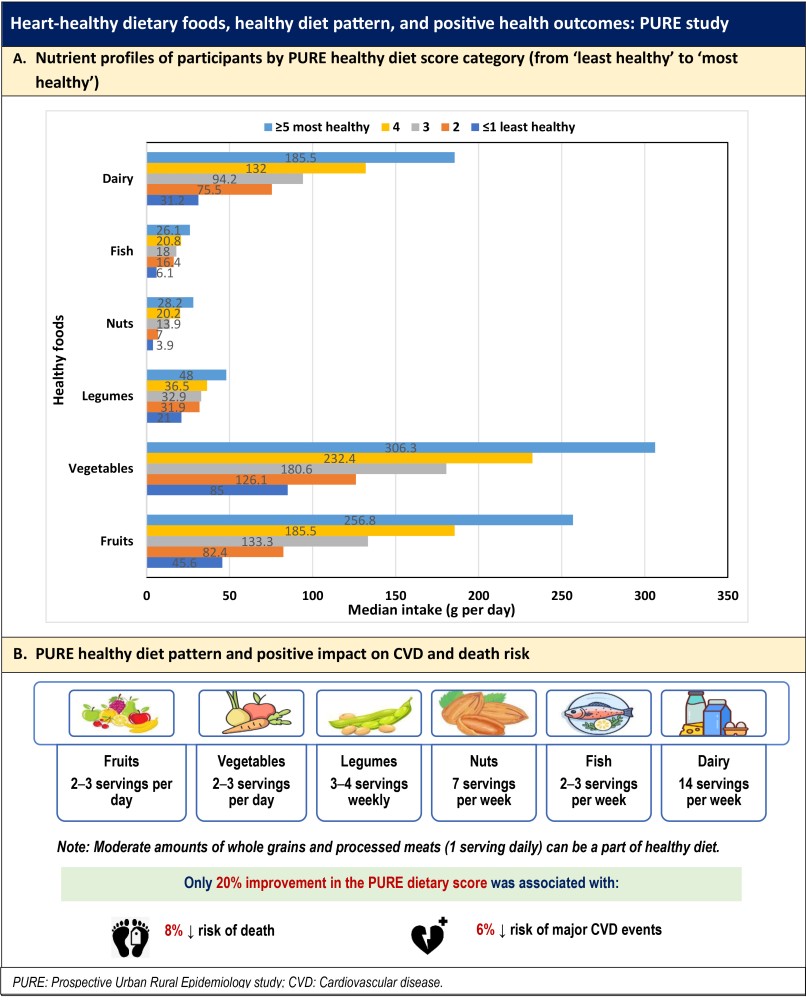
Unhealthy diet is considered a chief factor for death and cardiovascular disease (CVD). Numerous prospective cohort studies have revealed the correlation of specific foods, nutrients, and dietary habits with CVD, which forms the basis of current nutritional recommendations. Lately, studies have also confirmed that certain dietary exposures, such as whole-fat dairy (previously believed to promote CVD) are found to be either neutral or beneficial. A recent global study by Mente et al., published in the “European Heart Journal”, reported that, a healthy diet, consisting of higher amounts of fruits, vegetables, nuts, legumes, fish, and whole-fat dairy is associated with positive health outcomes, i.e., lower risk of CVD and death.
This study enrolled participants from the Prospective Urban Rural Epidemiology (PURE) study (an ongoing large-scale epidemiological cohort study in 1,66,762 participants, aged 35 to 70 years, from 21 countries, enrolled between January 1, 2003 and July 31, 2018). Dietary information was collected, and a healthy diet score was derived in 1,47,642 participants based on the association between six types of foods (fruits, vegetables, nuts, legumes, fish, and whole-fat dairy) and clinical events (major cardiovascular events, including myocardial infarction, strokes, heart failure, and cardiovascular and other mortality). The median follow-up duration was 9.3 years.
The calculated healthy diet score was assessed for consistency of its association with clinical events in three independent prospective trials (n = 43,834 vascular patients in 50 countries) and two case-control trials of myocardial infarction (MI; n = 26,191 in 52 countries), and stroke (n = 26,930 in 33 countries).
The study results are summarized below:
1. A ‘most healthy’ diet (diet score ≥5 points) corresponds to consumption of a variety of nutrients in moderate proportion [56% of energy from carbohydrates, 27% from fats, and 17.2% from protein]. On the contrary, a ‘least healthy’ diet (diet score with ≤1 points) included markedly lower amounts of each healthy food group (Graphic A and B).
2. A diet score of ≥5 points was related to reduced risk of mortality [hazard ratio (HR) 0.70; 95% confidence interval (CI) 0.63–0.77)], CVD (HR 0.82; CI 0.75–0.91), MI (HR 0.86; CI 0.75–0.99), and stroke (HR 0.81; CI 0.71–0.93).
3. A higher PURE healthy diet score was related to significant reduction in composite events across geographic regions and in nations with lower gross national income as compared to nations with higher gross national income nations (P for heterogeneity <0.0001; Graphic B).

Clinical implication
The findings of this study suggest that an inadequate level of consumption of key healthy foods (such as fruits, vegetables, nuts, legumes, and moderate amounts of fish and whole-fat dairy) is a much greater problemthan overconsumption of only certain foods such as saturated fats or meats, which contribute to increased risk of deaths and vascular events in adults.
(Source: Mente A, Dehghan M, Rangarajan S, O’Donnell M, Hu W, Dagenais G, Wielgosz A, Lear SA, Wei L, Diaz R, Avezum A, Lopez-Jaramillo P, Lanas F, Swaminathan S, Kaur M, Vijayakumar K, Mohan V, Gupta R, Szuba A, Iqbal R, Yusuf R, Mohammadifard N, Khatib R, Nasir NM, Karsidag K, Rosengren A, Yusufali A, Wentzel-Viljoen E, Chifamba J, Dans A, Alhabib KF, Yeates K, Teo K, Gerstein HC, Yusuf S. Diet, cardiovascular disease, and mortality in 80 countries. Eur Heart J. 2023:ehad269. Doi: 10.1093/eurheartj/ehad269)
